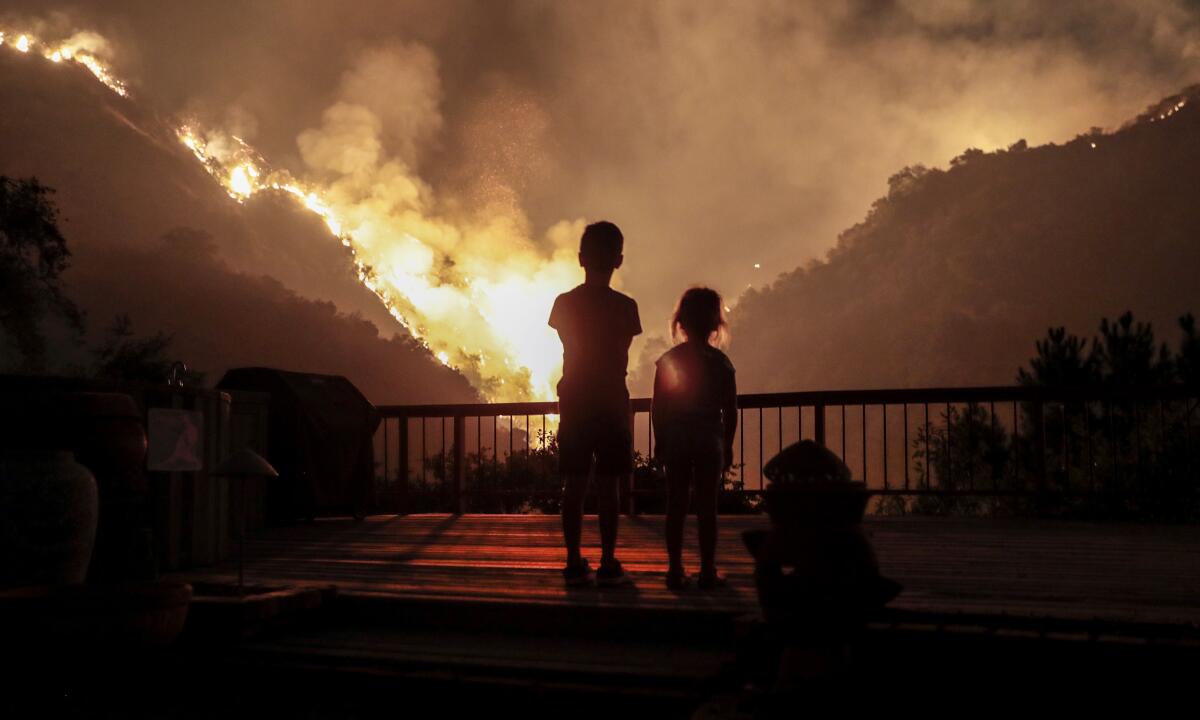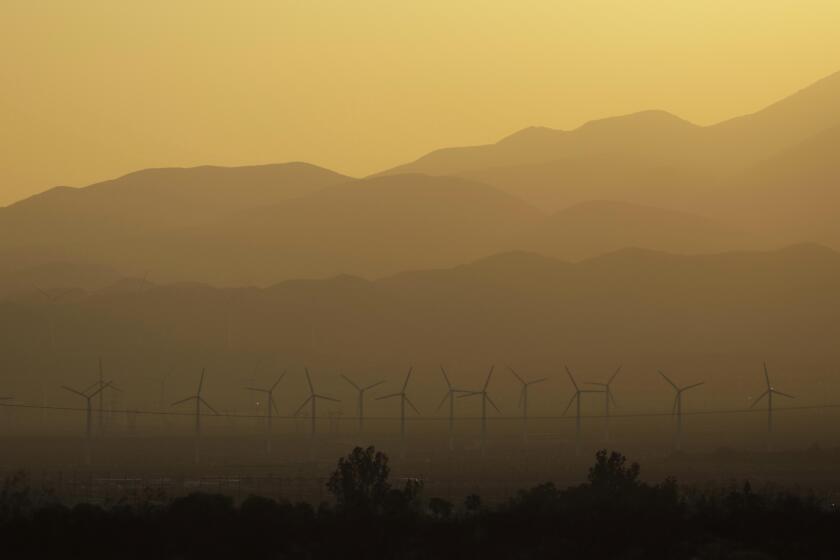Climate catastrophe is already here. What will it take for the world to act?

- Share via
A new United Nations report blares dire warnings of the escalating effects of climate change: Our planet is no longer on the brink of catastrophe; the catastrophe is well underway. How we respond now will determine how horrific things get for nature and humanity.
In a sweeping assessment released Monday by the Intergovernmental Panel on Climate Change, scientists from across the globe found that climate change is causing “dangerous and widespread disruption” to billions of people and the natural world. These effects are coming faster and harder than expected, outpacing our efforts and ability to adapt.
The burning of fossil fuels and other human activity have already warmed Earth by about 2 degrees Fahrenheit, compared with preindustrial levels. Such activity has worsened wildfires, droughts, air pollution and heat waves; caused animals to go extinct and trees to die en masse; swallowed up coastal habitat; reduced crop yields; increased hunger and shrunk glaciers and other critical water supplies. Any further delay to act “will miss a brief and rapidly closing window of opportunity to secure a livable and sustainable future for all,” a 35-page summary of the panel’s findings concludes.
These hard truths should jolt world leaders into immediate action to end the use of fossil fuels and to pour money into protecting communities and ecosystems from the impacts we have already unleashed and those that are yet to come. But, tragically, that seems unlikely. Against a backdrop of global instability and continuing pandemic, this report’s horrific implications will soon fade from the headlines, even as Russia’s invasion of Ukraine clearly illustrates the risks of dependence on Russian oil and gas. It is, after all, only the latest of many alarming reports from scientists over the decades that have largely gone unheeded.
Editorial: Climate change fuels deadly heat waves. Ranking them like hurricanes could save lives
Lawmakers should get behind legislation to make California the first state in the nation to rank heat waves, a step that could save countless lives.
Yet we cannot succumb to defeatism when the viability of our planet and our very lives are at stake. As the IPCC report makes clear, if humans don’t quickly reduce fossil fuel emissions, the result will be even more global conflict and upheaval, hardship and death. While no one on the planet will be untouched, the suffering from climate change will be deeply unequal, borne overwhelmingly by the low-income countries and people who are least responsible for causing it.
U.N. secretary-general António Guterres called the IPCC report “a damning indictment of failed climate leadership,” adding that “this abdication of leadership is criminal. The world’s biggest polluters are guilty of arson of our only home.”
This is indeed our fault and our responsibility. The United States is the world’s biggest polluter historically, having emitted more cumulative planet-warming emissions than any other nation. Even in California, efforts to reduce climate-warming pollution are not on track to meet state targets, which themselves are insufficient and outdated, having fallen behind those of other states and countries.
We can still avert the worst consequences of the overheating of our planet — mass extinction and catastrophically severe droughts, floods, heat waves and sea-level rise — if we cut emissions in half by 2030. But the U.S. and other top carbon emitters must lead the world in moving from incremental actions to a wholesale transformation of our energy system and aggressive investment in reducing the risks to cities, coastlines and sources of food and water.
Editorial: Los Angeles lags on building electrification. Now is the time to ban new gas hookups
Los Angeles trails more than 50 California cities that have enacted policies to ban or discourage gas hookups from new buildings.
Under the 2015 Paris climate agreement, virtually every nation on Earth has pledged to keep global warming “well below” 3.6 degrees Fahrenheit and aim to limit it to 2.7 degrees. Yet we are closing in on the 2.7-degree threshold. Even after a flurry of pledges made by world leaders at last fall’s climate summit in Glasgow, Scotland, the Earth remains on track to warm by about 4.5 degrees by the end of the century.
One way or another, we are headed for a massive transformation of society. We can choose to either usher it in through a swift embrace of clean energy or to ignore the warnings and accept a much more painful future in which our options will be limited by inaction and the devastating planetary change we have caused.
A U.N. summit will convene this fall in Egypt to scale up actions to fight climate change. Global leaders have already squandered decades of warnings from climate scientists and must not be allowed to waste another year dithering and passing off insufficient and incremental pledges as progress. We should all be incredibly angry with their complacency in the face of calamity.
Guterres said Monday that “delay means death,” and “now is the time to turn rage into action.”
Will anybody listen this time?
More to Read
Toward a more sustainable California
Get Boiling Point, our newsletter exploring climate change, energy and the environment, and become part of the conversation — and the solution.
You may occasionally receive promotional content from the Los Angeles Times.











